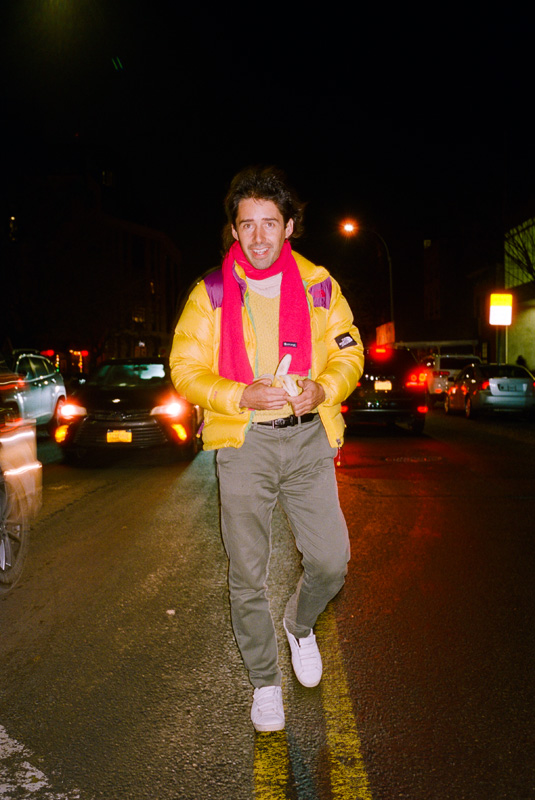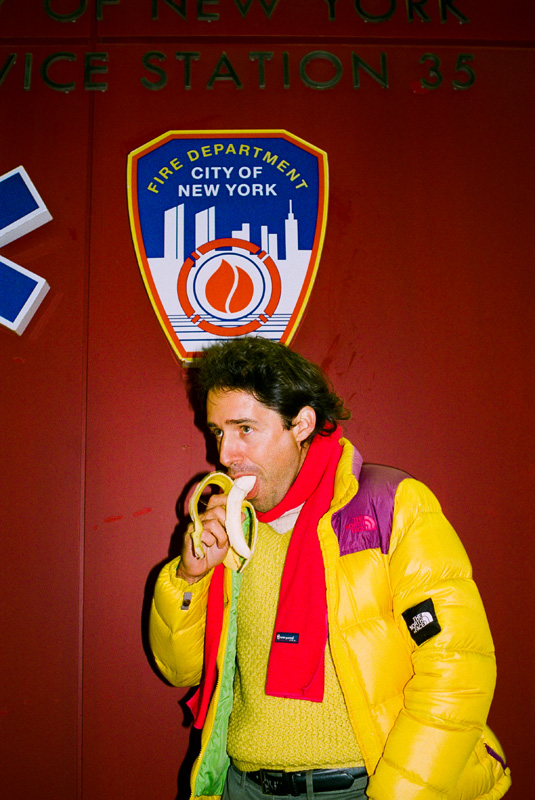Photos by Allen Ying.
Juan Wauters is a man of simple songs and intuitive thoughts. He expresses himself based on observation and after internally suffering from his own thoughts. The way he looks at life and gather his inspiration is not cryptic and it’s not based on fantasies – it’s about the pros and cons of diurnal life. Sung entirely in Spanish (his native language) Wauters gives us La Onda de Juan Pablo, his first album since 2005. A musical achievement birthed after traveling and temporarily living in various countries in Central and South America and the Caribbean. La Onda de Juan Pablo is Wauters own reflections on family origins, working within a broken system, and the love of sharing music and creating it. La Onda de Juan Pablo proves to be a recollection of ordinary moments, and a conversation that turned from observation into conversation and collaboration between strangers – who served as musical partners throughout his journey – and Wauters own humor, hope and euphony.
To give some context in the following exchange of questions and answers, these were the result of the second call I had with Juan, since our first conversation got deleted from my files.
Lola Pistola: Why did you decide to travel and make this album?
Juan Wauters: Just because recently I’ve come to realize that I have a Spanish speaking audience. Since I speak Spanish just as I speak English, I said I must sing [Spanish]. I wanted to record an album in a Spanish-speaking country. First, I went out to Mexico thinking I would record the album in Mexico. But then I had an opportunity to travel to Argentina in South America for another reason. I just had gone on a tour and visited those countries and I had sampled their traditional music.
Did you plan on doing something traditional?
More than traditional I wanted to play and record music with people that play music in a different setting than I do and play a different type of music. That’s what makes them a traditional musician because they play music within a setting that is traditional. Something that I was very conscious of is that it was going to be a cultural exchange, more than a cultural approach. I’m not very knowledgeable of the different styles of the music in these countries. Like I am not Peruvian and I don’t play Peruvian music or carry that tradition. But in Peru, I met people who play traditional music and we could make music that was about their lives and my life. I would go out every night, see people play music. And we would play music and at some point, I’d approach them and tell them about my project and see if they were interested in playing music with me. Some people said yes, but a lot of people also said no.
We were talking about feeling nostalgic and the idea of leaving home.
I felt pretty nostalgic throughout the trip. Is the first time I’ve left my parents’ home. I finally got to experience living far away from home. That’s a big part of the American culture. In Latin America it’s not so common to leave your parents’ cities or homes. So you’re born and you live in the same town until you die pretty much. I guess because I was in New York I never thought of leaving the city. Being far away made me think of my parents, my friends, and New York a lot.
You also pointed out how people from New York don’t move to other states, but the opposite.
It never really comes to mind to leave the city because we have our own world there and there is really nothing that compares to New York in America. I had thought about maybe living elsewhere, in another country maybe but after I traveled and finished the trip and came back to New York, it made me realize that that’s where I feel I belong the most these days.
You are now in Puerto Rico visiting. How does it feel being there? The first single, ‘Guapa’, was inspired after an experience there.
I mean, I’ve been here many times already and it feels a little bit like home out here. This is one of the places that I thought maybe I would want to move. Maybe at some point I would live here, but not now. It feels great to be here.
I remember us talking as well about if it is any different for you writing songs in English and Spanish. You said no and mentioned the process itself is not different because it comes out as it is.
It comes very natural to me to do it in both languages. I come across a lot of people through my life that don’t speak English as their first language, but they like to sing in English. I’m always like, “That’s dumb.” I never really understood that. In France, let’s say, all the bands sing in English and then the lyrics in English are not the best. And then I’d be “Hey, why don’t you sing in French since you’re mostly singing to French people” and they’ll say something it’s difficult to write and sing in French. And maybe it is, I don’t speak French, but I don’t really believe that. I don’t think that’s true. That it’s very easy to sing in English? Why?
Do you think it’s because they just want to be more liked or accessible and that way it’s easier to approach people by singing in English?
I don’t think that’s what they think. I think the majority of the people don’t like that. I think it’s because they consume too much of that music and they make a parody of it. I can say that because there are bands that I like that sing in English and they’re not from an English-speaking country. Maybe they’re look to have an international projection, but I think in my experience you have to say I can do it and then you can do it. If you approach it thinking – this is too hard, I can’t do it, that rhyming words in Spanish or rhyming words in French it’s more difficult, the language is very poetic, I don’t think I am able, capable of doing it… then you won’t do it. In my approach, I know that what I do is exactly what I do. I don’t think it’s worse or better of what it is. That’s what it is and that’s how it is, I am aware of my capacities and I play around that. I never try to do something that doesn’t come to me naturally. I don’t take things to a place that would be force.
I asked you why you decided to travel and make music in the places you went, you replied that it wasn’t really planned. Noticing that you have a Spanish speaking audience and how that brought you to make an album fully in Spanish. This translates to anybody that listens to the music and songs in this album – it’s very you, no more or less. There’s a full expression regardless of the language.
I try really, really hard. I put a lot of effort in everything that I do. Everything that I sing has gone through a process of making it the best I can. It takes a lot of time. I’ve been writing songs for a long time so it’s an exercise that I’m already comfortable with. I think I am confident in what I do. That’s also why I don’t think it’s difficult to either write in English and or Spanish. I don’t think they are different from each other. The only thing is when you’re singing in Spanish, I’ve noticed, specially with this album and perhaps because of what I’ve been going through at the time, when I sing in Spanish the things, I say are different from the things I say in English. The language itself has a different feeling.
Was there anything specific in your mind around that time of traveling and discovery?
I was thinking a lot about what work means to humans these days. What society has made us think that work is, and I was thinking a lot about what comes with that. I think, you know how in America everybody asks you what you do all the time? It’s usually a really horrible question because nobody really likes that question. What they’re really asking you is how do you earn your money. How do you make your moves, and that’s really not what you do, cause what you do is many things. Let’s say, this morning, if you asked me what you do, in America I would say I make a living with the music that I’m writing and playing shows. Easy, right? But that’s not what I do. Like this morning I woke up, visited a friend, there’s another friend [who’s] also in P.R. and we saw each other, drove around, went to see Monica, another friend of mine, and now I’m about to go eat. These are the things I do (laughs). I’ll probably go to the beach later. It’s a very complex question that is put into the context of this modern capitalist world.
I was thinking a lot about this and how, unfortunately, the majority of humans in the world – their works, their jobs are not the same as what they would do best, what their passion is, what it is that they are capable of doing best. That it could be cleaning the floor, cooking, driving a car, maybe you really like being an engineer, being a doctor, you can be anything. I’m sure there’s people for everything. I’m sure there’s people that want to do every single job in the world if you let them choose their jobs.
I was thinking a lot about this, about works and dreams and the illusions that come along living life under these circumstances; the circumstances of having a job that doesn’t make you that happy and how you balance that lifestyle with the beautiful things in life as well. The lifestyle that everyone in my neighborhood and everyone in my family lives. I’m trying to get away from that lifestyle. It feels that’s the lifestyle we’re all meant to be, unfortunately.
That resonates when you’re surrounded or come from a place where people end up being content with the life they have because they can provide for themselves or their families. Survive paycheck to paycheck. That also happens with creative people who aren’t able to venture out of conformity and don’t see a future in pursuing a creative path based on money. Out here in New York, money goes towards rent, rehearsal spaces. To live and to practice your music or art… it makes you think how far are you willing to go for your music? Would money ever be a factor?
That’s how they get you. When you get tired, they get you.
Yeah. Do you feel there’s an end to that? What if there’s no support or money but you still want to make your shit?
It’s ok as long as I put a lot of love into this. It’s my personal space. I don’t compromise much. I’ve had all these different types of jobs. I went to school too, and I am not afraid of working any type of job. But at the same time, I’m very confident there’s going to be a point in my life where I can live comfortably doing what I love doing. Just because I envision it like that. I’m not rushing to get to that place anytime. It’s ok if it happens now or down the line. Until then I’m doing ok. It’s all a process. Also, I know myself and I know the things I do, and I know how I do it. I understand why I am where I am. I know that if I wanted to be more or less popular, I would have to change things, but I decide to do it this way because this is how I like it. This is my personal space in which I decide to do it. You know as creative people we all know what it is we are doing right or wrong in order to become, or even make money. I’m not rushing, I’m really happy where I am. I think I am where I deserve to be. Everything I’ve done has put me here. At the same time, I’m not the kind of person that is looking for fame. I actually fear fame. I take it very lightly.
Fame as a temporary subject, or fame as in not being able to do what you want to do when you want to?
More like… you know when some people say they’d like to play at a stadium in front of thousands of people yelling their name?
Yeah…
I wouldn’t mind that, but if I get to that, I’ll get to that on my own time. I am a very reserved person, [in] that I keep to myself a lot. But because I love playing music, I share with the world what it is that I do. It makes me uncomfortable to have people thinking that I’m special, or that what I do is special, and that when I go to the concert, they’re excited to see me. Which I’m really happy about, but at the same time it is intimidating to have people that are just like you looking up to you a little bit.
This is something that I deal with. I love doing my music and sharing it. I want to go as far as I can. But the two universes live in my music. I think I’m always hitting the right balance. I think I’m really good where I am. I’m really happy to have a group of people that support what I do.
That’s important.
You know when other people talk about fans and stuff like that… I mean I’ve had people come to me and say, “I’m a big fan”. Ok I take it. But at the same time, I don’t want to think these people are my fans. I just want to think we all have a similar taste in life. That’s pretty much what puts us together. Something similar. Perhaps that thing similar at that moment is the music that I do. But if you think beyond that, it’s that we just like the same music (laughs). Or we like something about life that puts us together at that moment, at the concert. Step by step. I don’t really think about it all that much.
You can follow Juan Wauters on Facebook, Twitter, and Instagram











